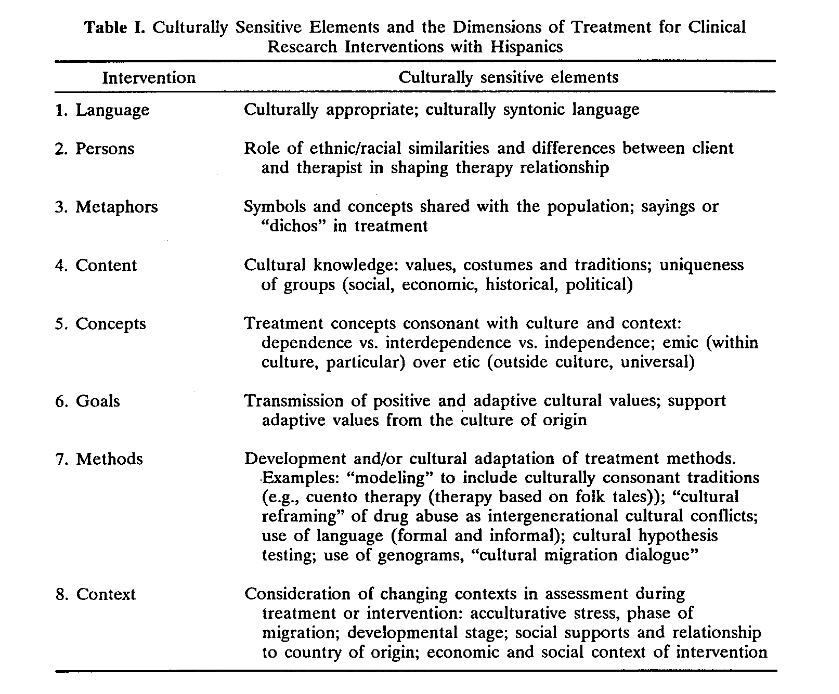Ecological validity and cultural sensitivity for outcome research - Issues for the cultural adaptation and development of psychosocial treatments with Hispanics
Bernal, Guillermo, Janet Bonilla, and Carmen Bellido. 1995. “Ecological Validity and Cultural Sensitivity for Outcome Research: Issues for the Cultural Adaptation and Development of Psychosocial Treatments with Hispanics.” Journal of Abnormal Child Psychology 23 (1): 67–82. https://doi.org/10.1007/BF01447045.
Notes
- The paper provides a framework for developing culturally contextual psychosocial treatments
- It draws from a works based on sociology and anthropology to map the different dimensions of culture that is crucial for cultural contextualization
- While the framework was mainly developed for psychosocial treatments, it does show potential for adapting it to other contexts as well given that it based literature that is broadly applicable to culture and society in general
- Many other works are also done to adapting this framework to different contexts such as education, etc

In-text annotations
"y sensitive research are rev&wed. The second objective is to present a preliminary framework for culturally sensitive interventions that strengthen ecological validity for treatment outcome research. jective is to present a preliminary framework for culturally sensitive interventions that strengthen ecological validity for treatment outcome research. The frarnework, consisting of eight dimensions of treatment interventions gthen ecological validity for treatment outcome research. The frarnework, consisting of eight dimensions of treatment interventions (language, persons, rnetaphors, content, concepts, goals, rnethods, and context) frarnework, consisting of eight dimensions of treatment interventions (language, persons, rnetaphors, content, concepts, goals, rnethods, and context) can serve as a guide for developing culturally sensitive treatrnents and" (Page 1)
"Alternatively, the hypothesis of cultural compatibility suggests that treatment is more effective when it is compatible with client cultural y, the hypothesis of cultural compatibility suggests that treatment is more effective when it is compatible with client cultural patterns (Tharp, 1991). The second approach considers the cultural context patterns (Tharp, 1991). The second approach considers the cultural context in the design of the" (Page 2)
"ecological va- //dity as early as 1977 with the seminal work of Urie Bronfenbrenner (1977). gical va- //dity as early as 1977 with the seminal work of Urie Bronfenbrenner (1977). Later, Washington and McLoyd (1982) proposed the need to consider" (Page 3)
"According to Washington and McLoyd (1982) cultural validity refers to the methods needed to identify "rules" governing the behaviors of in- to the methods needed to identify "rules" governing the behaviors of in- dividuals, groups, and larger systems, lnterpretative validity is rooted in the dividuals, groups, and larger systems, lnterpretative validity is rooted in the notion that the motivations, backgrounds, goals, and procedures for achiev- notion that the motivations, backgrounds, goals, and procedures for achiev- ing goals of the person or persons under study conditions their aßtions and ing goals of the person or persons under study conditions their aßtions and thus need to be considered in research. Ecological validity is defined as the g goals of the person or persons under study conditions their aßtions and thus need to be considered in research. Ecological validity is defined as the degree to which there is congruence between the environment as experi- degree to which there is congruence between the environment as experi- enced by the subject and the properties of the environment the investigator enced by the subject and the properties of the environment the investigator assumes it has (Bronfenbrenner, 1977). In turn, population validity is con- assumes it has (Bronfenbrenner, 1977). In turn, population validity is con- cerned with the issue of generalization. Can generalizations from the sam- cerned with the issue of generalization. Can generalizations from the sam- ple be made to the population? Further, can generalizations from the ple be made to the population? Further, can generalizations from the original population contemplated in the study be made to other target original population contemplated in the study be made to other target populations? Finally, construct validity is an integration of ecological, popu- populations? Finally, construct validity is an integration of ecological, popu- lation, interpretative, and cultural validities since the logic of research as- lation, interpretative, and cultural validities since the logic of research as- sumes that the construct in question means what it is supposed to signify. pretative, and cultural validities since the logic of research as- sumes that the construct in question means what it is supposed to signify." (Page 3)